
If the idea of probate litigation confuses and alarms you, this article will shed light on the subject.
Probate litigation is a lawsuit that takes place in probate court and refers to disagreements on how a probate estate is managed.
Usually, it is filed by beneficiaries or heirs against a personal representative or a third party.
Why do disputes come up in probate in the first place?
Recognizing the causes of probate conflict helps nip it in the bud. The following are the most common reasons for estate disputes:
There are many other reasons that can spark disagreement between parties involved in the probate process that are not listed above. The ones mentioned are just the most common.
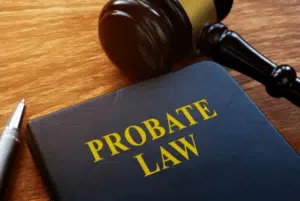
If there is a will, someone in the family may not agree that it is valid and would want to contest it. Or someone may distrust the executor and intend to challenge their appointment to the role.
On the other hand, if there is no will, the family may disagree on who can best serve as the administrator. In some cases, someone in the family could attempt to contest the person requesting to become the administrator.
An heir or beneficiary could feel like the executor or administrator is mishandling the estate.
They could file in court against the personal representative, attempting to have the court demand an accounting or remove them from their position.
An heir or beneficiary could disagree with the amount that the executor or administrator says they will receive from the estate.
Overall, a dispute can occur at any point in the probate process.
Understanding the estate dispute process helps you prepare any necessary documents, whether you are the complainant or the defendant, and set proper expectations of what is about to happen.
The probate litigation process goes through these five phases:
Pleading is making a formal accusation or allegation against the other party. The dispute begins with this phase, where each party states the legal basis for their claim.
In an estate situation, a pleading or an allegation examples may be:
Each of these is an example of an allegation. That’s not an exhaustive list, however. Those are some pleadings that we often see in Georgia probate disputes and in our office.
Discovery is just a fancy word for investigation, and it allows us to investigate the facts surrounding the allegations that were made.
In this phase, each party uses legal tools to gather evidence to support their claims in their pleadings. Some of these legal tools are:
Why are we doing all this?
Because we have to produce evidence to support the allegations that we made in the pleadings phase.
If we don’t have evidence to support those allegations, our case will not go well when we present it in court.
The court may decide against us because the court can’t just look at allegations of what we think is going on; the court has to look at the evidence we can produce showing what’s actually going on. That’s why discovery is important.
Motion is when a party in the dispute asks the court to do something or make a decision. The most common are motion to compel and motion for summary judgment.
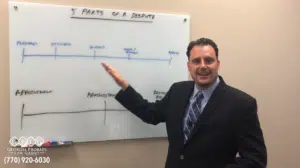
Some Examples:
Those are two motions that are often made in cases to give you some examples. There are many, many other types of motions that could be made.
A trial or a hearing is the main event of the dispute.
At this stage, the parties present their evidence and witnesses, and the court determines the outcome of the claims made during the pleadings.
Either party will attempt to convince the court to favor them based on the evidence provided.
Throughout the case, there can be and probably will be other hearings.
If we filed a motion for summary judgment or a motion to compel, the court will often order a hearing on those motions, and we’ll go to court and argue about those particular items in the case.
By trial or major hearing, we mean the trial of the case. At this trial, the court will hear and consider the pleadings we made at the beginning.
We’re going to present the evidence we discovered in our investigation and ask the court to decide in our favor based on that evidence. The other side is going to do the same thing, trying to get the court to decide in their favor based on the evidence they’re presenting.
But at the end of this hearing, at the end of this trial, that’s going to decide all the matters in the case. And so the case will be finished once that ends.
Though not often used, an appeal can be filed when a party believes that the judge made a mistake at the trial that would affect the case’s outcome.
Most people refrain from using appeals because, to file an appeal, a legal mistake must be made by the court. It is not something you can do just because you are not pleased with the result of the trial.
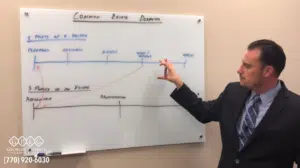
In fact, in Georgia, in virtually every metro county, the judge, at some point, is going to order a probate mediation.
A mediation is nothing more than a formal settlement discussion in which both parties and their attorneys come together in a conference room to discuss their issues in an effort to settle them. A mediator is present.
Mediation is not binding unless the parties come to some sort of agreement and agree to make it binding.
When litigation starts, there are two paths that it can go down.
It can proceed all the way to the final trial of the matter, which would be the conclusion or the end of the case, or it could end at any point before trial if the parties come to some sort of negotiated settlement or some kind of agreement.
That agreement could be just about anything.
Estate battles can be chaotic once they start, so it’s best practice to take proactive steps to avoid them and try to keep relationships intact.
From the moment the will is made known to family members up to the point of distribution, conflicts can happen at any time. These are the most typical types:
Family members may have conflicting interests, but ultimately, everyone has one goal—to resolve probate litigation and move on with their lives.
The following ways can help resolve disputes:
It can start with informal negotiations that could lead to a settlement, typically between the attorneys at different points throughout a dispute.
Another way is through mediation. It is a formal process designed to encourage settlement, and the court requires it in almost all cases. All parties meet, and a mediator is present to help resolve issues and determine if a settlement is possible.
If all parties agree, a dispute can end immediately with a written settlement. Since there are very few limits on what the parties can agree upon, all options are on the table.
If all attempts to resolve the dispute have failed, a hearing may occur. Both parties must produce evidence, an investigation will take place, and the probate court judge will decide on the outcome.
While this guide provides an overview of how disputes work in probate, it may not be enough to keep you out of trouble, mainly if family disputes have already occurred years before a loved one’s passing.
We recommend that you seek assistance from an experienced probate litigation attorney to navigate the situation as stress-free as possible. If you have any questions or concerns regarding the probate process, contact our office at (770) 796-4271.
Disclaimer These websites have not been reviewed by Georgia Probate Law Group and are not endorsed or even recommended by Georgia Probate Law Group. These websites are additional resources that you can use to further your general education on this topic.
Disclaimer: The information above is provided for general information only and should not be considered legal advice. Our probate attorneys provide legal advice to our clients after talking about the specific circumstances of the client’s situation. Our law firm cannot give you legal advice unless we understand your situation by talking with you. Please contact our law office to receive specific information about your situation.
Compassionate listeners, knowledgeable guidance. Schedule a free consultation with our team and let us help you and your family with your legal concerns.
GET IN TOUCH 770-796-4685Learn Important Probate Essentials, including key things that go wrong in an estate, how to prevent them, and what to do if they happen.
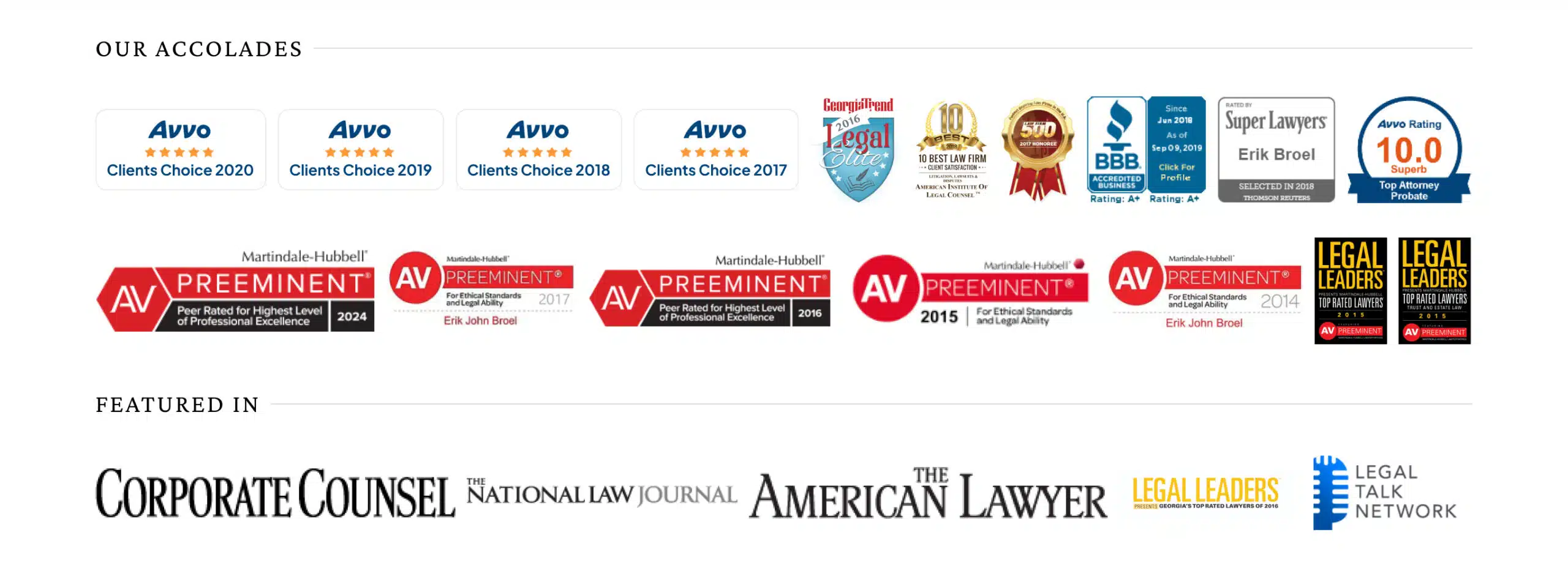
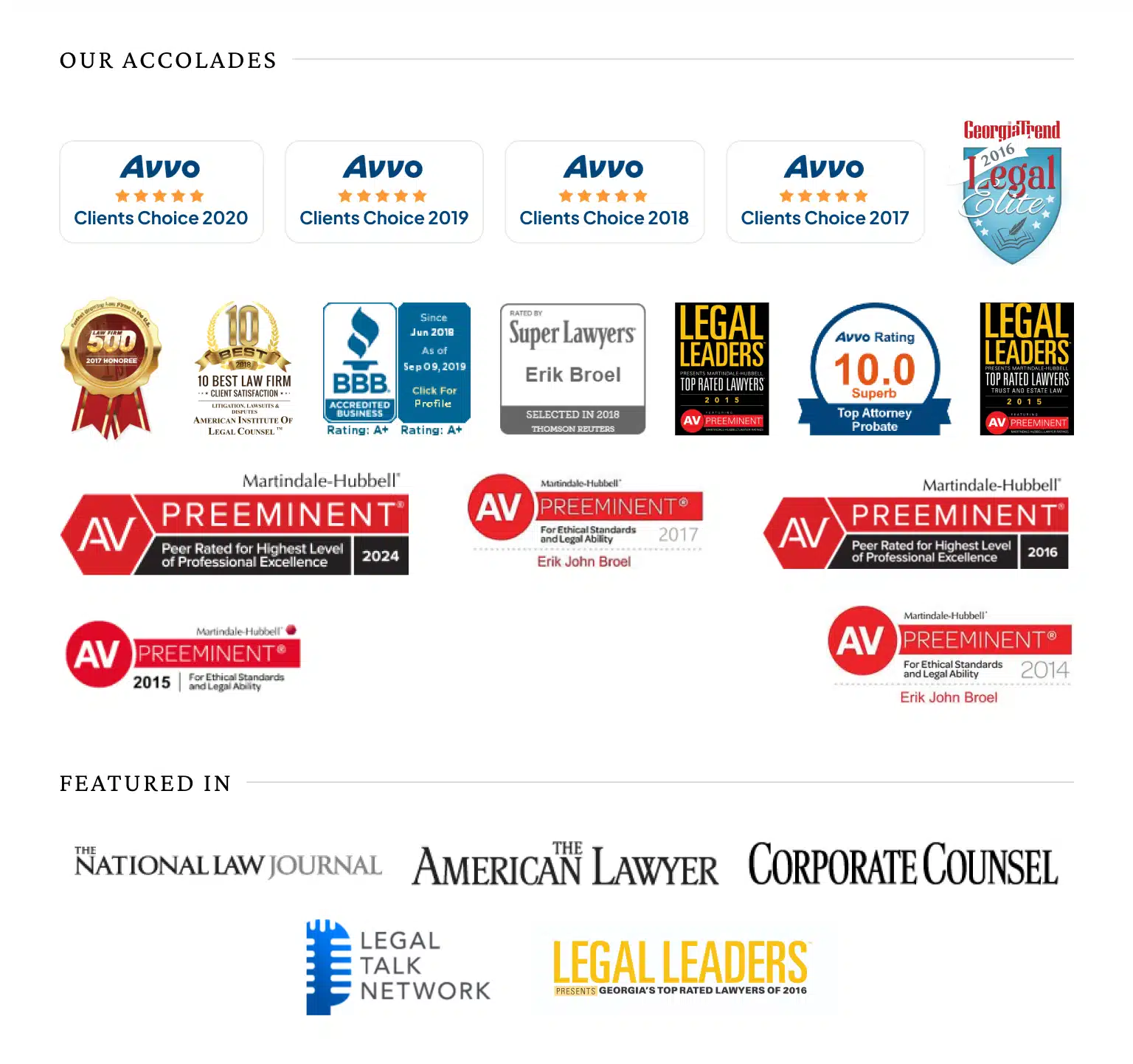

© 2025 Georgia Probate Law Group by Broel Law, LLC. All rights reserved.